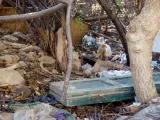Lebanon: the state of waste
Product details
Table of contents
A visitor to Beirut is likely to experience the foul stench of the Burj Hammoud landfill at least once. Residents living in a three kilometer radius of the site are exposed to more than three times the normal dose of the malodorous compound hydrogen sulfide, the American University of Beirut’s Nature Conservation Center demonstrated in February this year [Figure I].[1] Prolonged low level exposure to the gas - which smells of rotten eggs - can lead to “eye inflammation, headache, fatigue, irritability, insomnia, digestive disturbances and weight loss.”[2] The stench is one of the more superficial products of Lebanon’s seeming inability to sustainably treat its own waste, which has also resulted in a string of environmental and humanitarian violations including widespread waste burning in the country’s poorer regions.
Lebanese residents are no longer able to ignore the waste around them. Sociologist John Scanlan has observed that below the ordered and familiar topography of the city exists a “shadow counterpart” which we rarely think about. This unwelcome shadow “resists our attempts to disconnect from it.”[3] The garbage crisis of 2015 exposed this jarring disconnect between the two topographies and along with it, the failure of politicians to provide basic utilities including waste collection and treatment. Since then, Lebanon’s management of waste has received greater scrutiny; and yet the country continues to landfill and dump around 75 percent of its refuse. With waste production in the Middle East set to double by 2050, it is clear that Lebanon must break free of the cycle of emergency waste plans it has relied on since the civil war, as soon as possible.
This paper will outline the causes and repercussions of the 2015 garbage crisis, examine data on Lebanon’s solid waste management (SWM) and critique the Environment Ministry’s most recent plans to handle the country’s solid waste.
